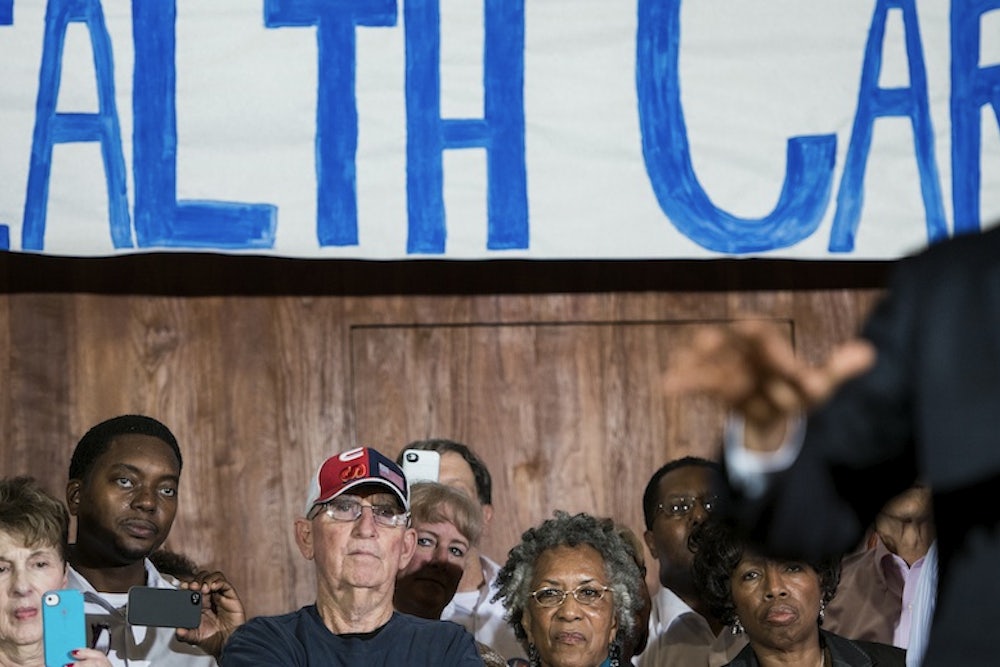Today it’s a few hundred thousand people. By next year, it will be at least a few million. Their health insurance status is changing dramatically: What they have in 2014 and beyond will look nothing like what they had in 2013 and before. For many of these people, the difference will be hundreds or even thousands of dollars a year. In a few cases, it may be the difference between life and death.
You probably think I’m talking about the people getting cancellation notices about their private insurance policies. I’m not. I’m talking about the people getting Medicaid. Both stories are consequences of the Affordable Care Act. But one is getting way, way more attention than the other.
It’s no mystery why. Stories of people losing something are more compelling than stories of people gaining something. The policy cancellation story is also newsier, because fewer people expected it to happen. Obamacare’s expansion of Medicaid was something the advocates of reform advertised. Reform’s effect on people with skimpy or medically underwritten insurance policies they liked was something that few advocates, including the president, even acknowledged. Had Obama pointed out, all along, that some people might lose existing plans or pay more for coverage in 2014, it would seem a lot less shocking.
But there is also a class element to the way this debate has evolved. By and large, the people receiving those cancellation notices and facing large premium increases are at least reasonably affluent. They’re not necessarily rich, particularly if they live in higher cost areas of the country. Many of them sweat monthly bills just like most of the country does. But, by definition, they don’t qualify for huge subsidies that would offset premium increases mostly or completely. By contrast, the people getting Medicaid are poor. They have to be, because it’s the only way to sign up for the program. And as political scientists have shown, the poor don't command the same kind of attention from politicians that the middle class—and particularly the upper middle class—does.
And this fact, I suspect, is also magnifying the impact of those cancellation letters. The best estimates suggest that 12 to 15 million people currently buy coverage on their own—i.e, in what's known as the non-group market. It appears that only a fraction of them will get to keep their current policies. The rest will end up having to get new coverage, or updated versions of their old coverage, that offers greater benefits and/or is available to everybody, regardless of pre-existing condition. That will drive up the price of insurance.
But when you take into account the subsidies, which for many people will knock the price of insurance right back down, and the number of people who would gladly pay more for insurance that offers real protection from financial shock, the number of people who truly end up feeling worse off ends up a lot smaller than 12 or 15 million. And even those people will end up with good health insurance, though they’ll be paying more for it and may not want it.
Meanwhile, the best available projections suggest that 13 million people will eventually sign up for Medicaid. That’s a much larger number of people, most of whom had no insurance—none—before. That doesn’t even include more than ten million presently uninsured people expected to get insurance through employers and the new marketplaces, assuming all of the websites start working better, or the millions of seniors getting extra help with their prescrpition drugs.
Of course, the story of the Medicaid expansion is also one of suffering. But that’s because Republicans governors and lawmakers are blocking expansion of Medicaid in their states. About 5 million people who would be eligible for Medicaid under Obamacare's new guidelines won't be getting it. Here’s a mental exercise. How many stories have cable news and the networks run about people with private insurance getting cancellation notices? And how many have they run about people who would be getting Medicaid if only their state lawmakers would stop blocking expansion?
You can find examples, usually from domestic policy writers in print. My colleague Alec MacGillis has waged a lonely crusade to remind people about this situation. The New York Times had a terrific front-page story on this in early October, and Politico's Jen Haberkorn wrote about it a few weeks later. In the Washington Post, Ruth Marcus on Friday wrote about Paul Tumulty, in Texas, who can't get insurance because Governor Rick Perry has blocked that state's Medicaid expansion. Tumulty, who is the brother of Post staff writer Karen, has kidney disease. Wiithout Medicaid he can't get comprehensive coverage, because, as Karen put it, "he is, paradoxically, too poor for subsidies."
But these articles are the exception more than the rule. Obama tried to draw attention to the issue last week, when he visited Texas. But the trip didn't generate much in the way of new coverage of Medicaid.
Should the president have been more candid about the impact his plan would have on people buying their own coverage? Yes. Should we pay attention to those people, particularly when they must now pay more for equivalent coverage? Definitely. Should this put extra pressure on the administration and some states to fix their websites? You bet. But that's not the only Obamacare news right now. The law is making life better for a great many people—and would help even more if only Republican lawmakers would relent. Those stories need attention, too.
